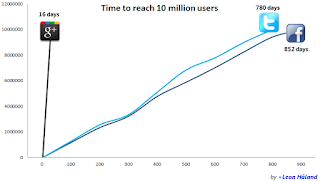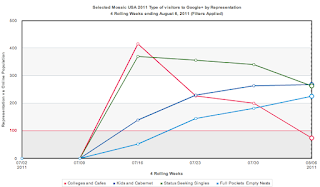Tweet
The following is a work of speculative fiction, not a prediction; however, I believe this is one possible outcome of the decisions Google is making today. Do you agree? Read on and please criticize or comment.
Please note: all characters appearing in this work are fictitious. Any resemblance to real persons, living or dead, is most likely coincidental. And, as always, this and other posts on my blog are my opinion and do not reflect the opinions of others.
------------------------
SXSW 2015 was amazing; I can't believe another South by Southwest is here and gone so soon.
The hot new startups this year were Splork, Thlong and Yitchy--all wearable hardware concepts that auto-report your bodily functions to social networks. Facebook launched FBClassic, a version of the service based on its 2009 interface, to appease those people chronically unable to adapt to its regular upgrades. Also, Ford showed off the new Focus with a physical Like button built into the dashboard--drivers will be unable to start the car without first "liking" the brand.
Of course, the big buzz was about Google. The mighty and revered internet giant has fallen on hard times as of late. In February 2015, the once unimaginable happened; Google accounted for less than 50% of U.S. search volume for the first time in almost ten years. Google is still very profitable, of course, but the loss of over 3 billion search queries every month has sorely reduced advertising revenue, once Google's core cash cow. The news was merely the latest insult to injury for Google, which saw its ad revenues surpassed by Facebook's in 2013. The company founded on search now earns more from its mobile products than it does online operations.
So, what happened? How did the house that search built lose its firm foundation? Some would say that Google's inability to launch a successful social platform was the problem, and they'd be partially correct. After Orkut, Wave and Buzz crashed to earth, Google shot for the stars with Google+. As it turned out, G+ was more like a child's model rocket than an Atlas V--it had a terrific trajectory after opening to the public, but soon it lost traffic and active users. G+ continues to do well in certain circles (no pun intended), but it has not thrived as Google hoped.
The fact Google never found the right social recipe wasn't the real problem; instead, it was how the company reacted (some now say overreacted) to the fear of a Facebook planet. In early 2011, CEO Larry Page announced that 25% of employees' bonuses would be tied to how the company performed in the social space. With that incentive in place, it was off the races to succeed in social, no matter the cost. Cost it did--in ways Google never expected.
Google's first step was the "+1" button. It seemed a fine idea, but Google's search algorithm was already the gold standard for providing highly valued and trusted search results. When Google decided the "+1" button should affect search engine rankings, it opened Pandora's Box.
SEO experts questioned if +1 could be used to manipulate search results, and their answer seemed to come from an article posted on Forbes.com entitled, “Stick Google Plus Buttons On Your Pages, Or Your Search Traffic Dies.” After meeting with Google's ad team, author Kashmir Hill came to the conclusion declared in the article's title--sites had better implement "+1" or suffer the Google consequences. Suspicions were aroused when that piece suddenly disappeared from the Forbes web site without explanation.
Fears that Google's "+1" button might spark a new wave of black hat SEO tactics were validated by Stephen Colbert, of all people. The Comedy Central star took a cue from his 2006 Wikipedia stunt and urged fans to click a "+1" button on his fake Web site announcing his candidacy for the 2012 GOP nomination. Within days, the Google search for "GOP 2012" featured Colbert's site in the top position.
Google's search and social problems did not stop with the "+1" button. The launch of Google+ raised more questions about how Google's search results would be affected by activity on Google's social network. Within months, people who signed up but never or rarely used Google+ noticed that their G+ profiles appeared on Google's first page when they searched for their name; people questioned why their lightly-trafficked G+ profiles appeared in front of far more relevant links to their blogs, articles and more active social profiles.
These issues came to a head in 2014 when the DOJ filed an antitrust suit against Google. The blogosphere erupted when a popular tech blogger was called to testify. He often spoke of his close relationships with Google engineers, and he was probed about the information and opinions he posted on G+ and his blog. In one such post he stated, "I hope everyone leaves Google+. Why? ... If everyone left Google+ that would leave the best SEO technology out there to just, well, me. Which means my videos, blogs, and photos would appear higher on search than yours."
Asked if he was aware whether a share on Twitter or a public post on Facebook was less influential in Google's search results than a G+ post, the blogger confirmed that was his understanding. When he was asked if it made sense that Google+ shares counted more than shares on social networks that are substantially larger and more active, the blogger's attorney objected.
That question was never answered, but the damage was done. Between Colbert, the DOJ lawsuit and a host of criticism on social networks, the impervious Google began to look mortal. Bing began to chip away more at Google's search share, and with the 2013 launch of its first true search engine, Facebook's search queries soared. More important than stealing search volume from Google, both Bing and Facebook also stole search ad revenue.
The moral of the story seems clear in retrospect--don't be evil. That old and unofficial Google motto seems more relevant than ever. Attempting to leverage its strength in search to close the considerable lead others had in social wasn't the right thing to do for Google or its many users. It undermined trust in Google--once the most respected brand in the world, Google let its social ambitions get in the way of its commitment to users.
Of course, no one should count Google out. It is still among the largest tech brands in the world, and its OS runs more than 60% of the smartphones in the US. Google's early and somewhat disappointing work in serendipitous search back in 2013 is developing into a truly robust and powerful tool in 2015. A new alpha version of Google Me was demoed at SXSW last week and caused jaws to drop--watch for it on your Android phone before 2016.
Google has an advantage in the serendipitous search space but it also has real competition, even on its own mobile platform. Competitors range from enormous (Microsoft's Sense) to a small but interesting new startup out of Ev Williams and Biz Stone's incubator, Obvious Corp.
I am anxious to see where Google, Microsoft, Facebook and the latest slew of startups find themselves this time next year at SXSW 2016. Maybe by next year, the Google buzz won't be about the decline of search but about its driverless, autonomous vehicles. Rumors were rampant in advance of SXSW that Google would launch their next-generation vehicles as a taxi service at this year's conference. They were a no show in 2015, but SXSW 2016 is just twelve short months away!

 At a glance, the study seems to imply that brands are beginning to flock to G+, but even without doing any independent research, it seems there is a less glowing way to consider the same data. For example, while 64% of the top 100 brands have an active Google+ page today, 61% of them already had their page one month after G+ launched, so there has been almost no additional adoption in the past six months. And while the number of brands with 100,000 fans is up almost 75% in three months, two-thirds of the top 100 brands in the world have fewer than 5,000 "circlers" on G+. (To put that into perspective, AJ Bombers, a locally owned burger joint in Milwaukee, WI, is connected to more people on Facebook than the vast majority of top 100 worldwide brands are connected to on Google Plus.)
At a glance, the study seems to imply that brands are beginning to flock to G+, but even without doing any independent research, it seems there is a less glowing way to consider the same data. For example, while 64% of the top 100 brands have an active Google+ page today, 61% of them already had their page one month after G+ launched, so there has been almost no additional adoption in the past six months. And while the number of brands with 100,000 fans is up almost 75% in three months, two-thirds of the top 100 brands in the world have fewer than 5,000 "circlers" on G+. (To put that into perspective, AJ Bombers, a locally owned burger joint in Milwaukee, WI, is connected to more people on Facebook than the vast majority of top 100 worldwide brands are connected to on Google Plus.)


 Friendster was launched in 2002. It, too, was ahead of it's time; MySpace wouldn't convert into a Social Network until 2004 and Facebook didn't open up to the non-student public until 2006. While Friendster is still kicking, it is but a shadow of its much larger siblings; Facebook receives around 7,000% more traffic than Friendster at the current time.
Friendster was launched in 2002. It, too, was ahead of it's time; MySpace wouldn't convert into a Social Network until 2004 and Facebook didn't open up to the non-student public until 2006. While Friendster is still kicking, it is but a shadow of its much larger siblings; Facebook receives around 7,000% more traffic than Friendster at the current time. Silicon Valley Insider Henry Blodget produced an interesting evaluation of the 2007 ad revenues for 17 media companies. It demonstrates just how commanding Google has become in the ad business; not just the online ad business but the
Silicon Valley Insider Henry Blodget produced an interesting evaluation of the 2007 ad revenues for 17 media companies. It demonstrates just how commanding Google has become in the ad business; not just the online ad business but the